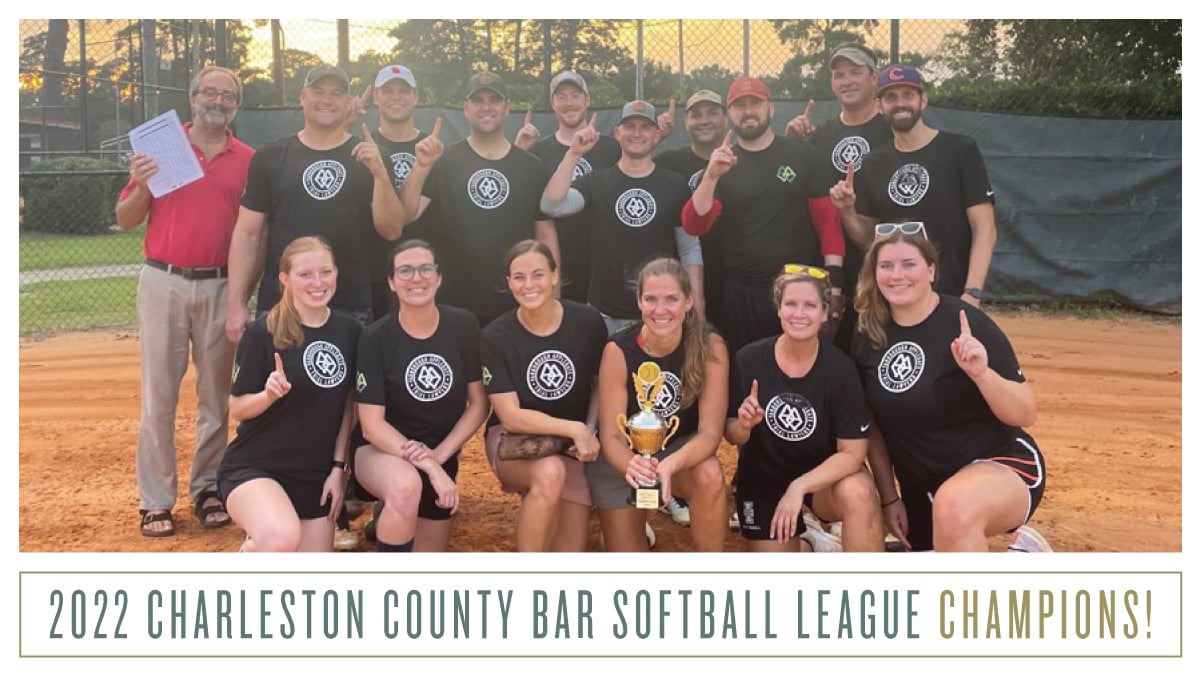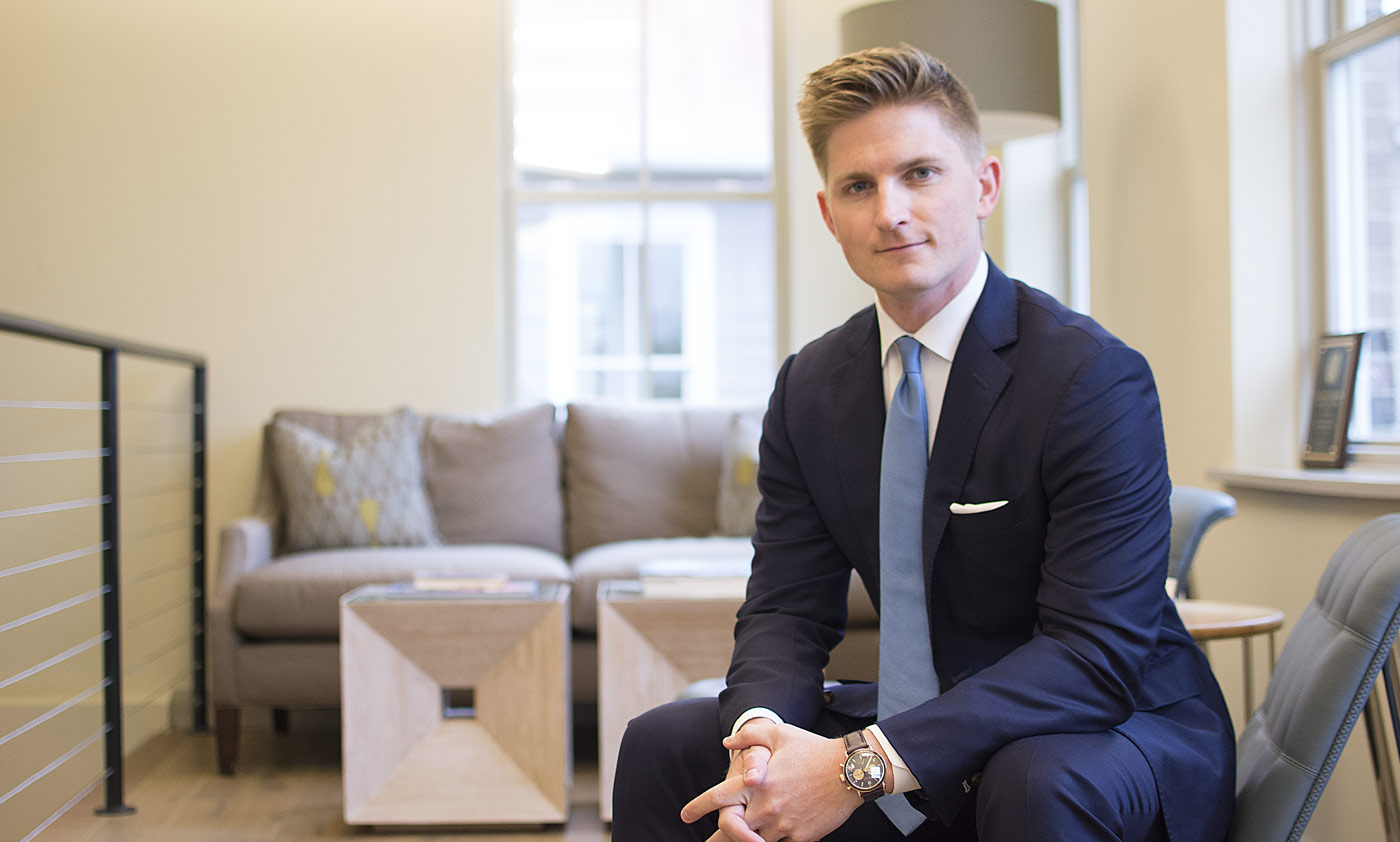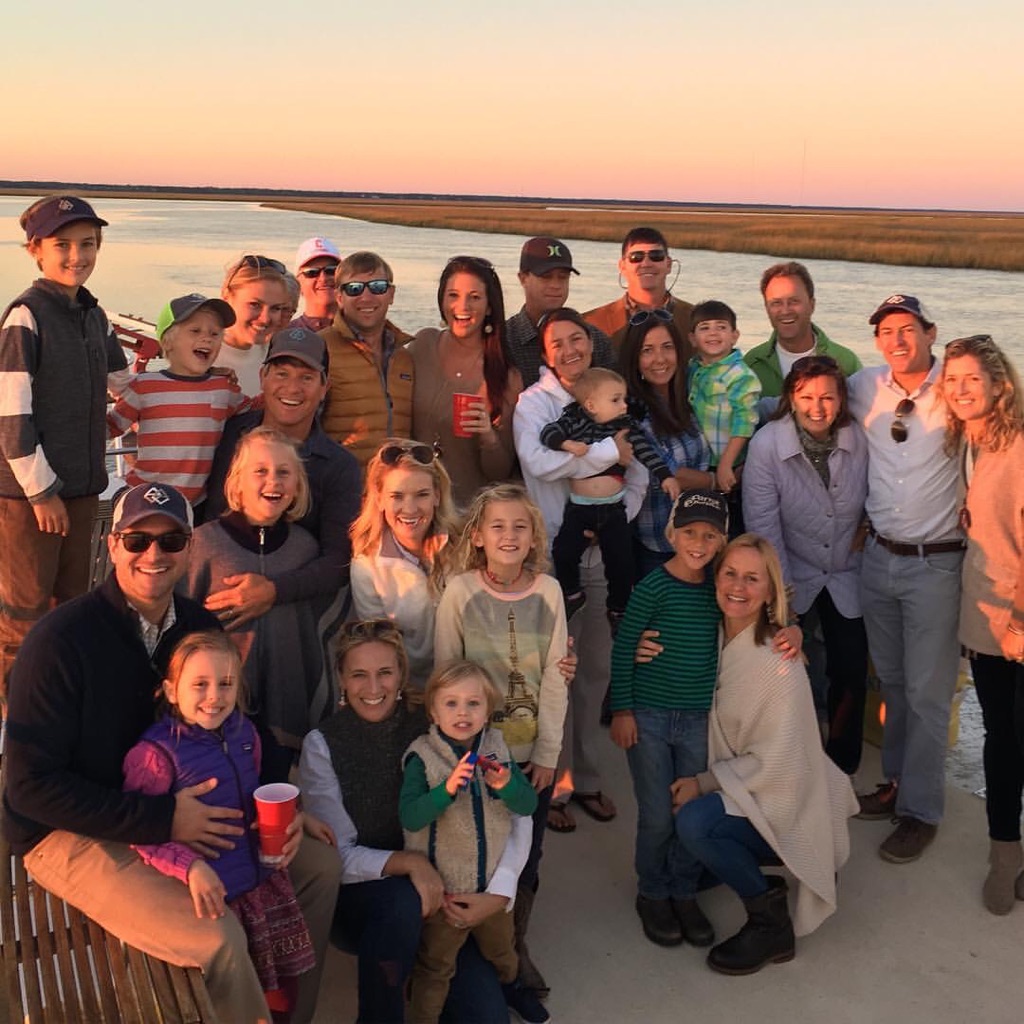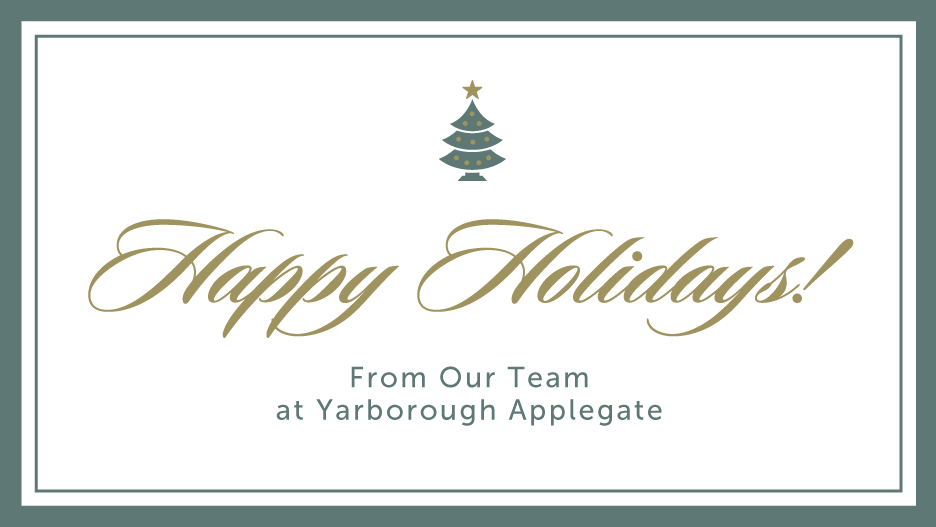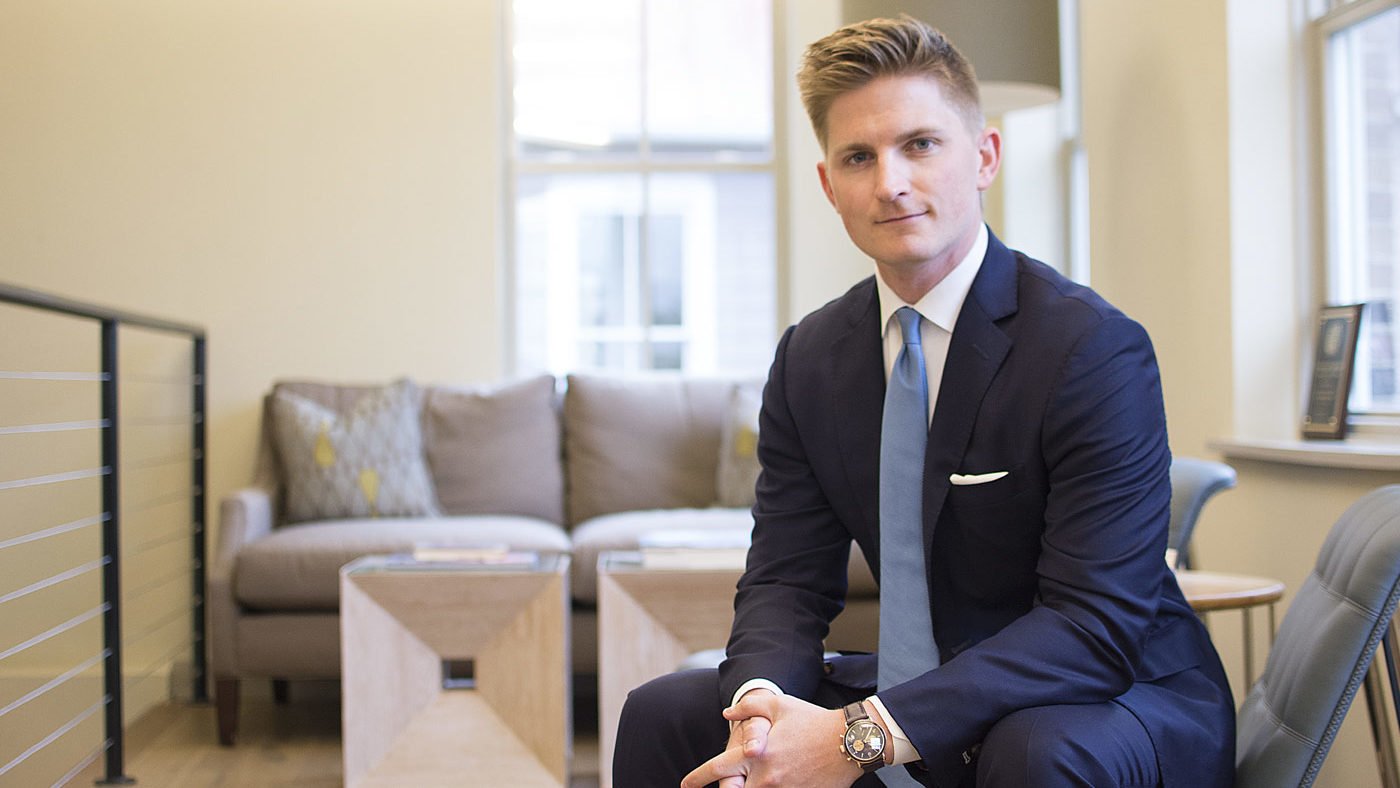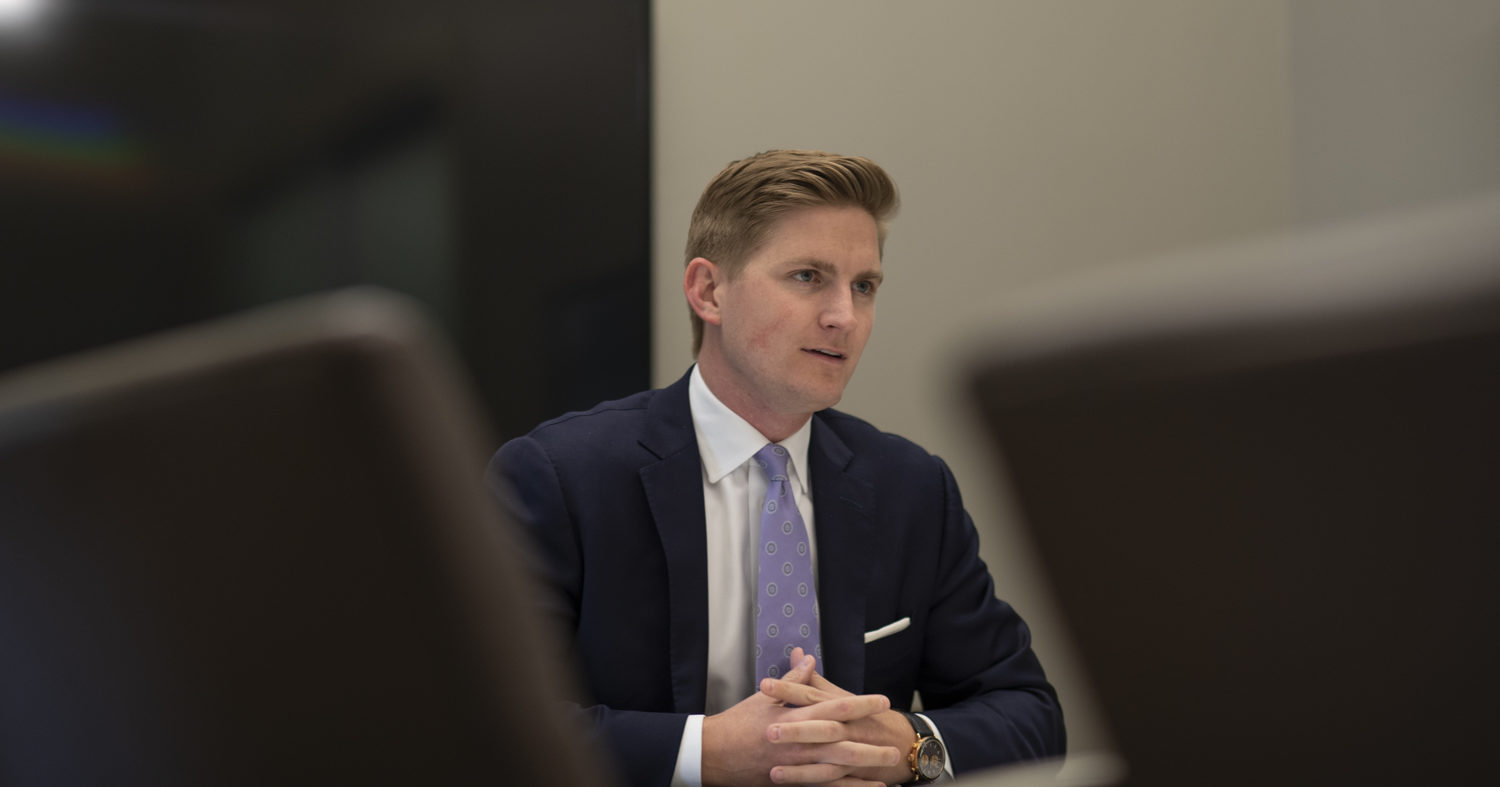Yarborough Applegate is known for our dynamic team of passionate, dedicated trial lawyers. Our Attorney Spotlight series highlights and celebrates each of their stories. Beyond their daily schedules, we want to know about their unique approaches to their practice and the ways they interact with their colleagues, the firm, and the communities they call home.
Join us as we sit down with each of our attorneys to learn what has shaped them, what drives them, and what they hope their lasting legacy will be. Today, we get to know Liam Duffy.
Yarborough Applegate (YA): Hi Liam, welcome to the Attorney Spotlight series! Let’s start at the beginning: Where are you from?
Liam Duffy (LD): I grew up in Washington, DC, where I was raised by two wonderful parents who spent many years in public service jobs working for the federal government. DC was an incredible, vibrant place to grow up. I have a lot of fond memories as a kid roaming the halls of the State Department, where my mother worked.
YA: That’s incredible. What brought you from DC to Charleston?
LD: I came to attend the College of Charleston. I studied political science and had some great professors, including Alex Sanders, the former chief judge of the South Carolina Court of Appeals and one of the founders of the Charleston School of Law. Judge Sanders is a bright legal mind and, as many can attest, one of the best storytellers in the South Carolina legal profession. I took a lot of “pre-law” classes, but his was certainly one that cemented my desire to go to law school after graduation.
YA: Was law a field you were interested in pursuing when you were younger?
LD: Not necessarily, but perhaps somewhere in my subconscious. Having grown up in Washington and in a political environment, there was a part of me that always recognized the importance of law and the power it can wield as a tool for positive change. In college, that interest grew when I had the opportunity to study topics like the philosophy of law, the judiciary, and the role lawyers and judges played in the Civil Rights Movement. And living in Charleston, I learned how South Carolina served as ground zero for many important legal battles that would go on to shape our country and the rights of its citizens.
YA: After law school, what were you doing before joining Yarborough Applegate?
LD: It’s a bit of a full-circle story. I worked at Yarborough Applegate as a law clerk during my final semester of law school. After graduating, I went to work for another Charleston law firm where I’d also worked during law school. In my three years there, I had some great mentors and got a very solid foundation for practicing law and learning what it takes to be successful in complex, high-stakes litigation.
YA: What brought you back?
LD: I was drawn back to Yarborough Applegate for a couple of reasons. One, I wanted to be in trial and in the courtroom more. And two, I wanted to be surrounded by people who share a passion for helping others and practicing law at an elite level. These days, it can be hard for younger lawyers to get trial experience, and I knew this was a place where I could do that. At the same time, I believe—as does everyone here at our firm—that the work we do on behalf of our clients truly makes a difference. Not only in the lives of our clients, but in improving the lives and safety of others in our community and state, and even across the country in some cases.
YA: On that note, can you tell us more about your practice here?
LD: I’ve handled a broad range of injury and wrongful death cases. Included in that are cases involving truck crashes, powerline electrocutions, dram shop liability, defective products, and third-party workplace injuries, just to name a few. But for me, it’s less about the specific industry or subject matter; it’s more about the people we’re representing. Unfortunately, the common denominator in all our cases is that we have a client whose world has been turned upside down by a death or catastrophic injury. That drives me to do all I can to help, starting with developing subject-matter expertise—be it in OSHA and workplace safety rules, trucking safety regulations, safe product design methods, or powerline maintenance standards.
To be an effective trial lawyer, I think you have to be committed to lifelong learning. To take that time in the office behind a closed door when no one is watching, honing your craft (including studying the great work of other lawyers) or immersing yourself in a new subject matter so that you can understand it—and communicate it to judges and juries—as well as the industry professionals. As a profession, if we’re serious about “leaving no stone unturned” and achieving full justice for our clients, it requires that level of commitment. And I like to think we practice that daily here at our firm.
YA: What is one of the most rewarding cases you’ve worked on here?
LD: It’s hard to pick one. At the risk of sounding cliché, every case where you can make a lasting difference in a client’s life after major adversity is incredibly rewarding. That said, if I had to pick a single recent example, it might be a case where we secured a substantial recovery for a hard-working mother in Louisiana who was seriously injured on the job when she fell through a hole on a three-story scaffold.
For one, it was great to be able to help and collaborate with co-counsel and clients outside South Carolina. The more people we can help, and in the more places, the better. But even more importantly, that case sticks with me because of our client. In cases like that one—where serious injuries happen on a construction jobsite—we often end up representing humble, hard-working people who are just trying to earn a living wage and feed their families. Many times, like in this case, our clients are immigrants who may be fearful or wary of the American legal system. But regardless of background, everyone deserves to go home safely at the end of a workday. And if that doesn’t happen because someone else cuts corners with safety, everyone has a right to be made whole under our system of justice. Nothing will ever fully restore her health, but in this case, we were fortunate that our legal efforts will ultimately leave the client and her family with a much more secure future.
YA: Has anything surprised you on the job?
LD: Good question. There are always surprises when handling legal cases that can last years. I think learning to be flexible and adaptive is key. This is probably less of a “surprise,” but I’ve learned that handling wrongful death cases is a unique (and emotional) experience. Most of the time, these are cases where you as the lawyer don’t know—and have never met—the person who has died and who you are, in effect, representing. But you come to know about and care for them through the shared stories of their family members and loved ones. And as the lawyer, you ultimately are charged with conveying their life story and the story of loss that follows their death. That’s an incredible privilege and honor, but one that certainly carries a lot of weight.
YA: What challenges have you faced on behalf of your clients?
LD: There are daily challenges that try to test our persistence and resolve (as well as our clients’). It is common in our judicial system for injured parties to face denials, delays, and other roadblocks when trying to obtain a recovery. Even something as simple as trying to get documents and information necessary to prepare a case for trial is a constant battle, and one that requires persistent and sound strategy.
There are also big-picture challenges with much broader and more concerning implications. For example, as trial lawyers we are constantly monitoring and pushing back against legislative or judicial initiatives that would negatively impact our clients’ rights to obtain full and fair justice in our courts. Our role as advocates for our clients should not be limited to courtrooms with juries. The same level of passionate representation is needed in our General Assembly and our appellate courts to make sure South Carolina’s laws don’t regress backward in a way that harms innocent victims.
YA: How has Yarborough Applegate shaped your approach to work?
LD: As a firm, Yarborough Applegate truly embraces a forward-thinking mentality and shares an unwillingness to get stuck in the status quo. One of my favorite quotes came from a coach and mentor years ago: “Complacency is the forerunner of mediocrity.” That mindset also exists at our firm. We try to never be complacent in how we practice, how we run our business, how we represent clients, or what tools we utilize to improve all of those areas. We’re constantly implementing new case technology, going to educational programs, trying to give back to the community, sharing thought leadership with colleagues, and taking a lifelong learning approach to our work. Nobody has it all figured out, so we’re always striving to get better.
YA: Well said! What’s the biggest misconception about what you do?
LD: Mass marketing and advertising firms within the “personal injury” space have shaped so much of our industry and heavily influenced the public’s perception of it. Those types of firms certainly serve a large segment of the market and help people who deserve compensation (and who may not have access to justice without those high-volume practices). But it’s important to understand that isn’t all that is out there; TV and billboard advertising aren’t reflective of the personal injury industry as a whole. On the other side of the spectrum, you have law firms like ours. As opposed to operating on an “economy of scale,” we’re very selective in the cases we take on and view our role as more like elite-level strategists or tacticians who handle complex matters. We’re looking for worthy causes—not just cases.
YA: Is there a book that’s made a significant impact on your life?
LD: Most of the time I find myself drawn to reading nonfiction. Lately, that’s been a lot by and about the Stoic philosophers of Ancient Greece. The original material—like the writings of Marcus Aurelius—is excellent, but Ryan Holiday’s The Obstacle is the Way and Stillness is the Key are great “modern-day Stoic” reads that I’ve really enjoyed. More in the legal space, I recently read U.S. District Judge Richard Gergel’s Unexampled Courage and would highly recommend it to every South Carolina lawyer.
YA: How about a favorite quote that inspires you?
LD: It’s hard to find a quote better suited for the career of a trial lawyer (and the ups and downs that come with it) than Teddy Roosevelt’s famous “The Man in the Arena.”
YA: What professional associations or community organizations are you a member of?
LD: I’m involved in several legal associations: the Attorneys Information Exchange Group (AIEG), the American Association for Justice (AAJ), and the South Carolina Association for Justice (SCAJ)—where I serve as the Young Lawyers Chair. For several years I also served as the 9th Circuit Representative for the SC Bar Young Lawyers Division. I volunteer with several local nonprofits, and in the future, I’d love to spend time serving on a non-profit board and using my legal background to help in that way.
YA: When you’re not working, where might we find you?
LD: Lately, at home with my wife getting ready for the arrival of our (first) child! Besides that, a mix of traveling, spending time with friends, playing sports, or catching live music.
YA: Congratulations! What advice would you give to an aspiring attorney?
LD: Stay hungry. Whether it’s every week, month, or a couple times a year, identify an area of your practice, a skill, or a technique you want to improve. It could be anything from a trial tactic to a listening technique with clients. If you do that consistently over the years, you’ll end up with a host of skills and strengths at your disposal.
YA: What impact do you hope your work will have?
LD: As an attorney, you certainly hope it has a positive impact on the clients that you represent. In our world, these are people who come to us often in their darkest hour of need, who don’t have anyone else to turn to and don’t know what to do. You always hope you can marshal them to some measure of light. With that in mind, on a larger scale, I hope my work can help prevent future cases like theirs. One of the most common things clients say to us, especially in wrongful death cases, is that they want to make sure this doesn’t happen to another family. When we’re able to do that, I can’t express how happy it makes clients, that their case could be the impetus to prevent future harm. So to the extent our work can incorporate mandates and lead to outcomes that make society better, safer, and more transparent—that’s the greatest impact we can make.


